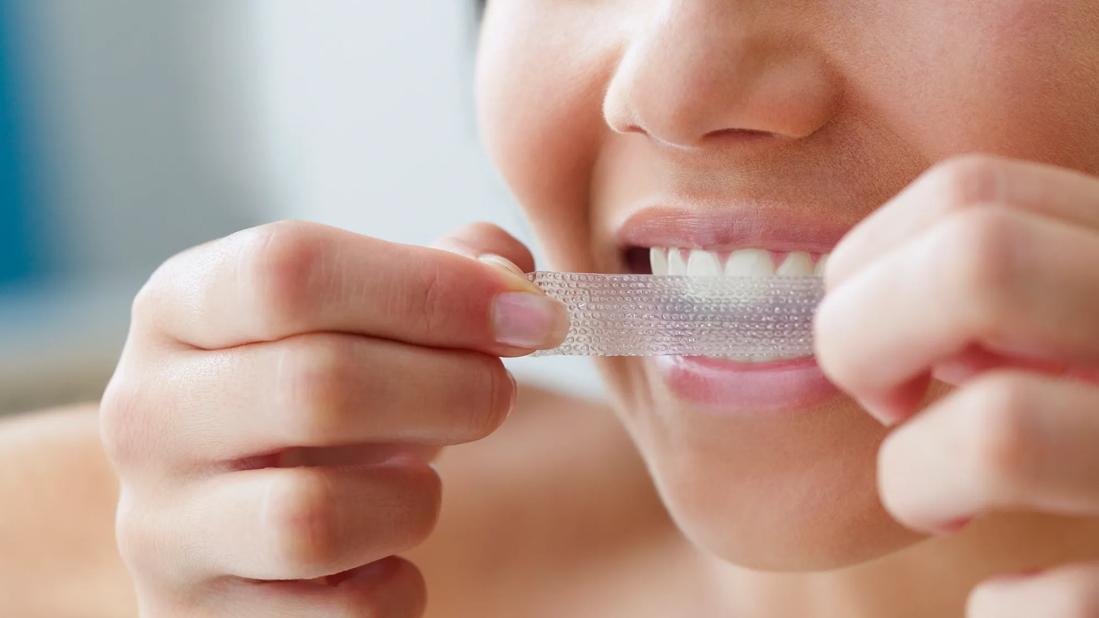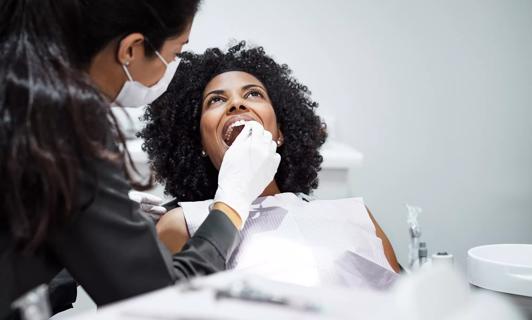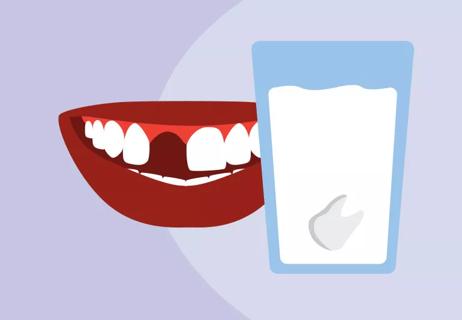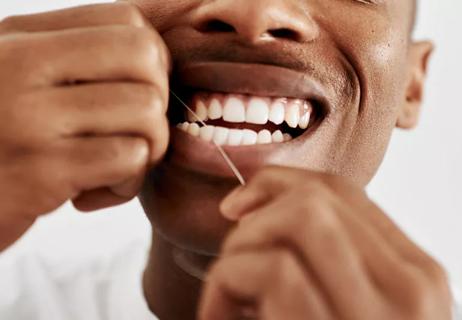At-home products like whitening toothpaste, rinses and strips can bring bright results

Nobody wants to flash a set of pearly yellows when they smile. But as you age, it’s natural for your once-gleaming grin to begin looking a little bit dingy as years of eating and drinking leave a mark.
Advertisement
Cleveland Clinic is a non-profit academic medical center. Advertising on our site helps support our mission. We do not endorse non-Cleveland Clinic products or services. Policy
So, perhaps you’ve started looking at teeth whitening products on store shelves and wondering if they’re safe and able to make a difference.
Dentist Anne Clemons, DMD, has your answers.
Video content: This video is available to watch online.
View video online (https://cdnapisec.kaltura.com/p/2207941/sp/220794100/playManifest/entryId/1_3suv2qv4/flavorId/1_5f3sgelj/format/url/protocol/https/a.mp4)
The magic of science can help make stains on your teeth disappear.
Most at-home teeth whitening products contain a bleaching agent like hydrogen peroxide or carbamide peroxide (a chemical that includes hydrogen peroxide). These ingredients work on a molecular level to whiten your teeth.
Tooth stains, after all, are merely an accumulation of darker-colored compounds called chromogens. Hydrogen peroxide breaks down bonds within those compounds to lighten up the stains.
“As those compounds get smaller, the discoloration becomes less concentrated and the net effect is brighter teeth,” explains Dr. Clemons.
Whitening toothpaste may also have an abrasive (such as baking soda) that works to reduce surface stains on your teeth. Think of it as a very gentle sanding that takes place every time you brush your teeth.
It’s not unusual to see your teeth noticeably lighten a few shades with regular use of at-home tooth whitening products.
Gel-filled trays work the fastest, with results sometimes seen in as little as a few days, researchers say. Whitening strips and gels typically lighten teeth within two weeks. Whitening toothpastes and rinses work more slowly.
Advertisement
“If you follow product instructions and stick with it, you’ll start to notice a difference,” says Dr. Clemons. “Don’t expect drastic changes, though, from pretty dark teeth to bright ones. It’s more of a gradual process.”
Professional whitening treatments — which use stronger concentrations of hydrogen peroxide or carbamide peroxide — may bring faster and more dramatic results. A 30-minute session with your dentist may be all you need for a much more radiant smile.
“You can walk in with one shade of teeth and walk out with them looking much whiter,” she says.
Overall, teeth whitening is considered safe. The products have been around for decades, and millions of people use them — including plenty of dentists, notes Dr. Clemons. “And we haven’t seen an increase in problems like cavity risk or tooth fractures after whitening,” she adds.
But as with any sort of treatment, the potential for issues exists.
“It’s very common to experience temporary sensitivity in your teeth or irritation to the gums after you start using a whitening product,” clarifies Dr. Clemons. “Both of those tend to go away pretty quickly, though.”
Laboratory research also points to the possibility of tooth erosion and changes in tooth microstructure through aggressive bleaching. Studies suggest, too, that whiteners may chemically react to ceramic crowns, sealants and other dental restorations.
But these studies were done in a lab setting and not on living teeth, emphasizes Dr. Clemons.
Bottom line? “There are risks with any sort of treatment, but teeth whitening products have been carefully formulated to make sure they’re safe for use on your teeth,” she confirms.
If you’re looking to add sparkle to your smile, Dr. Clemons offers the following advice to do it safely and effectively.
Your dentist probably knows your teeth better than you do, from your molars to your incisors. Use that familiarity to build a plan to brighten your smile, suggests Dr. Clemons.
For starters, a dentist can help you determine why your teeth might look a little discolored. That’s important because bleaching products work best on teeth that have yellowed with age or through staining by food or drinks. (Looking at you, coffee and red wine).
But brown or gray discoloration could signal problems that a bleaching kit won’t fix. Tackling concerns like gum disease or cavities before starting a bleaching treatment is also important.
“Take steps to get your teeth healthy before starting down any whitening road,” she advises.
Your dentist can also recommend the best products for you and your teeth.
Look for the American Dental Association (ADA) Seal of Acceptance on whitening toothpaste and other teeth bleaching products. It signals they’ve been found safe and effective in independent tests.
Advertisement
How often you use teeth whitening products varies based on the concentration of the bleaching agent. Some are designed to be used once a day, while others can be used twice (or more). Some are used for a week, while others can be used for two weeks (or more).
“That’s why it’s really important to read and follow the instructions to protect your teeth,” notes Dr. Clemons. “You don’t want to overdo it.”
As mentioned, some people develop temporary sensitivity in their gums or teeth when using whitening products. While that’s not a sign of long-term damage, it can be uncomfortable.
Consider taking a break from bleaching or switching to a milder product if it happens to you. Again, talk to your dentist for the right advice.
Search online and you’ll find some interesting theories on whitening teeth using cooking oils, apple cider vinegar and other kitchen staples. Activated charcoal powder is often mentioned, too.
But be wary of trying these alternative methods: “Some of these may seem harmless, but they can damage your teeth over time,” cautions Dr. Clemens.
Plus, there’s little to no evidence suggesting these methods are effective.
Also, while hydrogen peroxide is in teeth whitening products, DO NOT use the hydrogen peroxide in your medicine cabinet for dental care.
Advertisement
“The hydrogen peroxide in whitening products has been carefully formulated for use on your teeth,” explains Dr. Clemens. “Grabbing a bottle out of your cabinet for use is going to come with a lot of risk.”
Teeth whitening products can be effective and safe if used correctly. But don’t underestimate what regular dental cleanings can do for your smile. Seeing your dentist once or twice a year can help manage plaque and surface stains.
“If you want a brighter smile, teeth whitening products can be good tools,” says Dr. Clemons. “But they aren’t a substitute for good dental hygiene.”
Advertisement

Sign up for our Health Essentials emails for expert guidance on nutrition, fitness, sleep, skin care and more.
Learn more about our editorial process.
Advertisement

Daily oral hygiene goes a long way to keeping your mouth healthy and your smile bright

Start weaning your toddler off daytime pacifier use by 12 months old to help prevent dental issues and speech delays

Keep the nail file out of your mouth and leave any tooth shaving up to your dentist

Help and encourage them to brush and floss regularly, limit sugary foods and get routine dental checkups

Act quickly to increase the chances that your tooth can be saved

You can do damage to fillings, crowns and even your teeth themselves

No, oil pulling and vitamin D won’t fill or fix a cavity

Cavities, grinding or even a sinus infection could be behind your tooth pain

Even small moments of time outdoors can help reduce stress, boost mood and restore a sense of calm

A correct prescription helps your eyes see clearly — but as natural changes occur, you may need stronger or different eyeglasses

Both are medical emergencies, but they are very distinct events with different causes